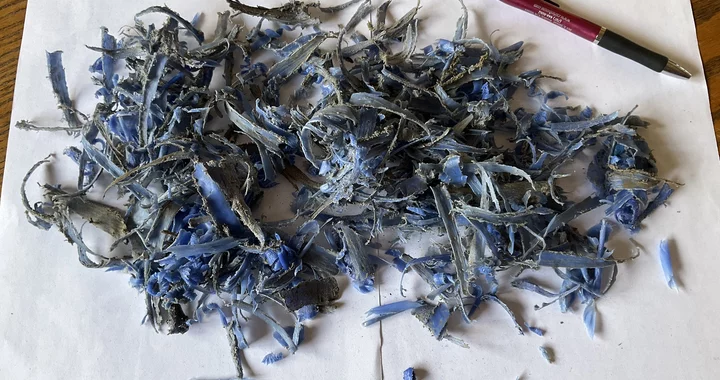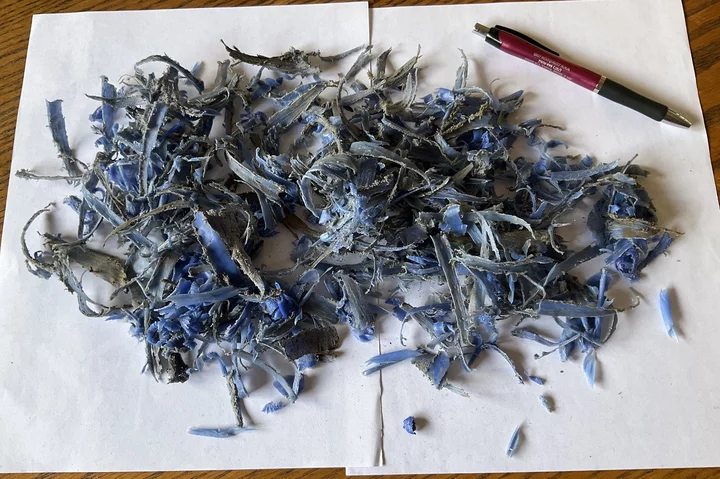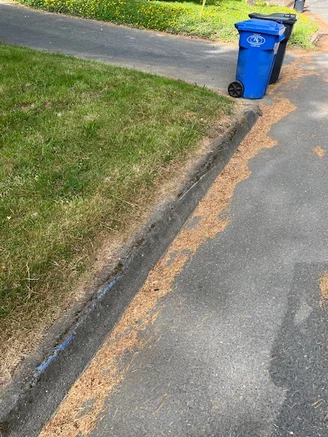Shards of recycling containers collected by the author in McKinleyville. Photo: Dan Levinson.
You’ve probably seen the
smudges and lines of what looks like light blue paint on the streets,
always in front of garbage containers or where they have recently
been. A closer look reveals that it is blue plastic rubbed off the
bottom of recycling and garbage receptacles when they are dragged by
service trucks. You might have also noticed curlicues of plastic
being stripped from the bottoms and sides of the bins, either from
abrasion on the streets or from the large metal forks that move the
receptacles. Though nearly all the scuff marks are on street
surfaces, the one in the picture represents a container being dragged
along an elevated curb. I include it here because it’s the
clearest example from several photos taken over a few years. The
other picture shows curlicues and scraps I’ve collected on my
neighborhood walks in McKinleyville.
The telltale blue streak on the curb. Click photo to enlarge.
It
might be unrealistic to expect Recology — our laudable cleanup and
recycling enterprise — or any other company on the planet that works
on this large scale, to replace their containers, at least in the
short term. However, I’ve written this piece in an attempt to get
the ball rolling, hoping that others will join my voice for change.
At this point in our collective ecological consciousness, it is
glaringly known how toxic and pervasive plastic is. I don’t need
to detail how its overuse, alongside other devastating practices such
as blithely hopping on airplanes for vacations, is destroying species
and habitats. (This world traveler hasn’t been on a plane since
2019 — but that’s another article.)
Four
years ago I brought a small bag of the blue shavings to the Recology
office, simply to share evidence that a company with such a name is
actively creating
plastic waste headed directly into the gutters and then the ocean.
The employee I spoke with was just about polite, but I got the sense
that she thought me a weirdo and I was pretty sure that little bag
was headed straight for the trash and not to any future meeting
regarding clean practices. From there I contacted a couple of people
at the Northcoast Environmental Center, emailing images of smudges
and streaks on the streets, as well an image of the shavings. Our
communication went well enough in the moment but did not lead to any
change.
Surprisingly,
I have not found references to any cities having addressed plastic
waste generated from recycling and trash bins. I have come across
the suggestion to apply protective coatings (but of what?) to a bin’s
underside or placing a buffer material between the bin and asphalt.
Might the arms of the metal forks get a rubber wrap to avoid cutting
into the plastic? Could Humboldt County set a precedent in trying to
solve this? Arcata’s city council, after all, was the first in the
nation to have a Green Party majority. My friends and I, naively,
used to refer to Humboldt as Ecotopia — but the county still sets
stellar examples of different environmental practices. Just think of
the transformation that became the Arcata Marsh and Wildlife
Sanctuary.
What to be done, then? Recology
might respond if citizens visit their office with little bags of blue
plastic shavings, followed up by letters, phone calls, and photos.
We could make a sculpture of plastic bits and set it in the Arcata
Plaza to replace President McKinley, akin to the Artula Institute’s
Washed Ashore project: you may have seen the elaborate sculptures
fashioned from ocean waste on display in Bandon, Oregon and
elsewhere. Perhaps most effectively, Recology could put an employee
to the task of sorting this out. In the meantime, I’ll keep
picking up trash on my daily walks and talking to kids about good
practices as I teach my poetry residencies. The steps to be taken
range from small to global. For instance, it’s hard to imagine
that any readers are still buying sponges made with petroleum-based
plastic — which means choosing to put plastic directly into their
drains — when alternatives are sitting right next to them on our
store shelves. The kids know what’s happening and they wonder when
the adults will stop sleepwalking.
###
Dan Zev Levinson is a teacher and a poet. His website is zevlev.com.



